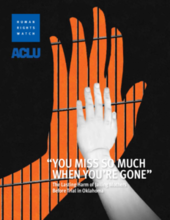Every day in Oklahoma, USA, women are arrested and incarcerated in local jails waiting— sometimes for weeks, months, a year, or more—for the disposition of their cases. Most of these women are mothers with minor children.
Drawing from more than 160 interviews with jailed and formerly jailed mothers, substitute caregivers, children, attorneys, service providers, advocates, jail officials, and child welfare employees, this report shows how pretrial detention can snowball into neverending family separation as mothers navigate court systems and insurmountable financial burdens assessed by courts, jails, and child welfare services—like in Tanisha’s case.
While most women admitted to jails are accused of minor crimes, the consequences of pretrial incarceration can be devastating. This report finds that jailed mothers often feel an added, and unique, pressure to plead guilty so that they can return home to parent their children and resume their lives. These mothers face difficulties keeping in touch with their children due to restrictive jail visitation policies and costly telephone and video calls. Some risk losing custody of their children because they are not informed of, or transported to, key custody proceedings. Once released from jail, they are met with extensive fines, fees, and costs that can impede getting back on their feet and regaining custody of their children.
In this report, Human Rights Watch and the ACLU urge Oklahoma and other states to require the consideration of a defendant’s caretaker status in bail and sentencing proceedings, expand alternatives to incarceration, facilitate the involvement of incarcerated parents in their children’s lives and proceedings related to child custody, and substantially curb the imposition of fees and costs, which can impede reentry and parent-child reunification.

